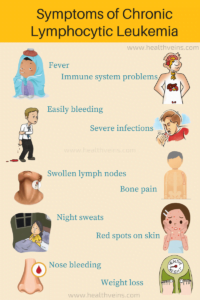Chronic lymphocytic leukemia (CLL) is a type of cancer which affects the white blood cells called lymphocytes. It is a kind of slow-growing cancer and a rarely seen disease. In this article, you can find useful information about chronic lymphocytic leukemia diagnosis and treatment.
Apart from that, you can find additional information on what cause chronic lymphocytic leukemia in the last paragraphs.
Chronic lymphocytic leukemia diagnosis and treatment
It starts in the lymphocytes cells in the bone marrow. In the beginning stage of Chronic lymphocytic leukemia (CLL) most of the peoples don’t see any symptoms for at least many months or few years. During this period cancer-causing cells can spread to other parts of the body, including the lymph nodes, liver, and spleen.
An excess number of lymphocytes crowd the bone marrow and interfere with normal blood cell production. The bone marrow produces inadequate numbers of red cells, normal white blood cells, and platelets. this leads to severe infections and bleeding.
Two types of chronic lymphocytic leukemia (CLL) cancer are:
- Slow-growing CLL – It may take more time to grow the cell before the patient needs treatment.
- Fast growing CLL – The cell grows faster and is a more serious, such that need treatment as soon as possible.
Let’s have a quick look to some of the main symptom of the disease before going detail into the topic chronic lymphocytic leukemia diagnosis and treatment
Symptoms chronic lymphocytic leukemia
Diagnosis of Chronic lymphocytic leukemia (CLL) cancer
Since the exact cause leading to the chronic lymphocytic leukemia (CLL) cancer is not known, the diagnosis of this disease at the early stages is also having limitation. It is assumed to result from damage to one or more of the genes that normally control blood cell development.
Doctors use many tests for the diagnosis of CLL. Most commonly used tests are
- Blood tests. A routine blood test would be enough for the diagnosis of CLL. This process is called a complete blood count (CBC). The CBC test measures the number of different types of cells in the blood sample of the diseased person.
- Flow cytometry and cytochemistry. In this tests, special kind of chemicals or dyes is applied over the leukemia cells in a laboratory. These applied chemicals and dyes provide information about the leukemia disease infection.
- Genomic and molecular testing. This is a testing process which targets the leukemia cells for a specific gene, proteins, chromosome changes, and other factors unique to leukemia.
Also read about the rare mesothelioma lung cancer
Treatment for Chronic lymphocytic leukemia (CLL) cancer
Most commonly treatment may not be necessary for early stages of chronic lymphocytic leukemia. Studies have shown that treatments given to peoples with early stages of treatment don’t extend their lives.
Anyhow, if a doctor determines the disease is a progressing stage or have reached the intermediate or advanced stages, then your treatment options they can opt according to their medical conditions are:
- Chemotherapy
Like the treatment given to any other cancer, chemotherapy is a treatment that kills cancer cells using drugs.
These cancer-fighting drugs may be given to the patient’s body in the form of pills or injected to their nerves.
- Targeted drug therapy
This treatment is also a kind of Chemotherapy, but it is designed to take advantage of a specific vulnerability of the cancer cells. Targeted drug therapy is more targeted to cure a specific kind of cancer cell. - Bone marrow stem cell transplants
Bone marrow stem cell transplant is a treatment which use strong chemotherapic drugs to kill the stem cells which create diseased lymphocytes in the bone marrow. Followed by infusing healthy adult blood stem cells from a donor into to blood of a diseased person. And there they travel to the bone marrow and begin to make healthy blood cells. - Surgery
In some patients where the stage of Chronic lymphocytic leukemia has gone worse, surgery might be the option of treatment. In cases of the disease getting worse than it starts destroying red blood cells and platelets in the blood, which should be removed by surgery. This operation is called a splenectomy.
What causes chronic lymphocytic leukemia
Now that you have read about the chronic lymphocytic leukemia diagnosis and treatment, let see what actually cause this disease.
The truth is even medical doctors aren’t sure about what starts the process which causes chronic lymphocytic leukemia. Some kind of uncertain factors causes the genetic mutation in the DNA of blood-producing cells. And this mutation causes the blood cells to produce abnormal and ineffective lymphocytes. The lymphocyte is a type of white blood cell that helps to boost the immune system of the body.
- Also read the article about heart wellness and tips
Apart from being ineffective, these abnormal lymphocytes will continue to live and multiply. And when normal lymphocytes would die, these abnormal lymphocytes will enter into the blood and certain organs. This will start to cause complications. They may also crowd healthy cells out of the bone marrow and interfere the normal blood cell production.
Doctors and modern medical researchers are working to understand the exact process which leads to the disease chronic lymphocytic leukemia.


